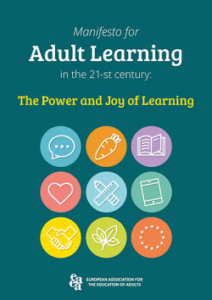
European Association for the Education of Adults (EAEA) updated its Manifesto with the purpose of demonstrating the benefits of adult learning.
The manifesto is targeted at European, national and regional policymakers in view of the upcoming European elections and will help communicate EAEA’s vision of a Learning Europe: all necessary skills, knowledge and competencies to develop a knowledge society that can deal with the challenges of our time.
In the 2016 version of EAEA’s Manifesto seven issues were identified in which adult education plays a fundamental role. In the current Manifesto, two new themes have been introduced: health and well-being and work and employment, so it presents nine current European challenges now, which adult learning helps to solve:
- Active citizenship and democracy: People who participate in adult education, participate in society, by voting, volunteering or taking active roles in communities.
- Health and well-being: Adult learners lead to healthier lifestyles and experience improved well-being. Adult education contributes to personal development and fulfilment. The health of our societies depends on lifelong learning.
- Life skills for individuals: Adult education transforms lives. It opens new job opportunities, creates pathways to learning, activates people’s artistic passions and builds new social networks.
- Social cohesion, equity and equality: Adult education supports greater social mobility and equalizes societies. Adult learning brings together people from different walks and stages of life. This benefits democracy and social peace.
- Employment and work: Workplace learning is one of the key drivers of adults´ participation in lifelong learning. Adult education increases innovation and productivity of employees, entrepreneurs and volunteers–this makes companies more successful.
- Digitalisation: Adult education helps to close the digital gap and provides individuals with digital competences, which are key to personal fulfilment, employment, social inclusion and active citizenship.
- Migration and demographic change: Civic education and intercultural learning create inclusive societies and cultures. Seniors who learn are more active, work longer and stay healthier.
- Sustainability: Adult education provides competencies, information, debating spaces and creativity to develop new approaches necessary for sustainable development.
- Adult education and European & international policies: European & international policies Adult education contributes to main European and international strategies in the fields of growth, employment, innovation, equity, social cohesion, active citizenship, poverty reduction, climate change, internal market, migration, peace and more.
For more information, please visit the EPALE web portal or download the online Manifesto
